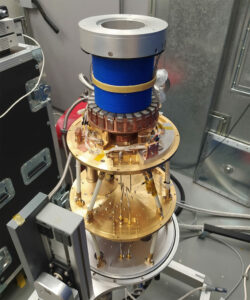About QTFP
Quantum Technologies for Fundamental Physics (QTFP) is a £40 million Strategic Priorities Fund (SPF) programme that aims to transform our approach to understanding the universe and its evolution.
The QTFP programme aims to demonstrate how quantum technologies can be utilised to investigate key fundamental physics questions such as the search for dark matter, the nature of gravity and measurements of the quantum properties of elementary particles, thus ensuring the UK remains a first rank nation in the physics and quantum communities around the world.
24 awards have been funded under this programme since 2020.
In late 2020, seven projects were funded with a £31 million investment to demonstrate how quantum technologies could solve some of the greatest mysteries in fundamental physics.

QI
Quantum-enhanced Interferometry for new physics
Principal investigator: Hartmut Grote
Using quantum technologies we can now explore new fields of physics, seeking answers to long-standing questions like “what is dark matter?” and “is space-time quantised?”
-

Strontium optical lattice clock experiment QSNET
A network of clocks for measuring the stability of fundamental constants
Principal investigator: Giovanni Barontoni
Using quantum technology we can now network ultra-advanced atomic clocks to investigate the origin of dark matter and dark energy, which constitute 95% of the universe, but have so far eluded any detection.
-

Low-noise cryogen-free cooler QTNM
Determination of absolute neutrino mass using quantum technologies
Principal investigator: Ruben Saaykan
The QTNM project aims to harness recent breakthroughs in quantum technologies to solve one of the most important outstanding challenges in particle physics – determining the absolute mass of neutrinos.
-

QSHS
Quantum sensors for the hidden sector
Principal investigator: Ed Daw
Amplifiers operating at the quantum limit are essential for probing the astrophysics of the hidden sector. With this technology, we could solve the dark matter problem.
-

AION
A UK atom interferometer observatory and network
Principal investigator: Oliver Buchmuller
Using ultracold strontium atom interferometers as quantum sensors to tackle open questions in fundamental physics, such as the nature of dark matter, the existence of new fundamental interactions, and novel sources of gravitational waves.
-

Nuclear demagnetisation experiment QUEST DMC
Quantum enhanced superfluid technologies for dark matter and cosmology
Principal investigator: Andrew Casey
Combining Quantum Technology with ultralow temperatures we can now search for dark matter in a mass regime that is strongly motivated by theory, but inaccessible using current techniques.

QSimFP
Quantum simulators for fundamental physics
Principal investigator: Silke Weinfurtner
We explore essential processes linked to the dynamics of the early universe and black holes, which are fundamental reflections of the interplay between general relativity and quantum fields through analogue quantum simulations.
In 2022, a further seventeen new awards were funded.
- Quantum sensing for antimatter gravity
Institution: UCL
Principal investigator: D. Cassidy - MeVQE: A world-leading centre for MeV scale entanglement physics
Institution: University of York
Principal investigator: D. Watts - Development of levitated quantum optomechanical sensors for dark matter detection
Institution: UCL
Principal investigator: P. Barker - Simulating high energy physics with quantum photonics
Institution: University of Bristol
Principal investigator: A. Laing - ParaPara: A quantum parametric amplifier using quantum paraelectricity
Institutions: Lancaster University, UCL
Principal investigator: E. Laird, E. Romans - Quantum computing for nuclear physics
Institution: University of Surrey
Principal investigator: P. Stevenson - Supercooled cosmological simulator
Institution: Newcastle University
Principal investigator: T. Billam - Testing theories of dark energy using atom interferometry
Institutions: Imperial College London, The University of Nottingham
Principal investigator: E. Hinds, E. Copeland - Differential atom interferometry and velocity selection using the clock transition of strontium atoms for AION
Institutions: Imperial College London, University of Oxford, STFC laboratories, University of Birmingham, University of Cambridge
Principal investigator: O. Buchmueller, C. Foot, P. Majewski, M. Holynski, U. Schneider - Penrose processes in an analogue black hole formed in hybrid light-matter (polariton) superfluid
Institution: The University of Sheffield
Principal investigator: D. Krizhanovskii - Synthesising quantum states of sound and listening to what they tell us about the universe
Institution: Imperial College London
Principal investigator: M. Vanner - Quantum simulation algorithms for quantum chromodynamics
Institution: University of Cambridge
Principal investigator: S. Strelchuk - Accelerating the development of novel clocks for measuring varying fundamental constants
Institutions: University of Birmingham, Imperial College London
Principal investigator: G. Barontini, M. Tarbutt - A quantum jump sensor for dark matter detection
Institution: Imperial College London
Principal investigator: J. Devlin - Increasing the science reach for quantum enhanced interferometry
Institutions: Cardiff University, University of Strathclyde, University of Birmingham, University of Warwick, University of Glasgow
Principal investigator: H. Grote, S. Reid, D. Martynov, A. Datta, R. Hadfield - Trapped electron for neutrino mass measurement
Institution: University of Sussex
Principal investigator: J. V. Galiana - Levitated Quantum Diamonds
Institutions: University of Warwick, UCL
Principal investigator: G. Morley, S. Bose
